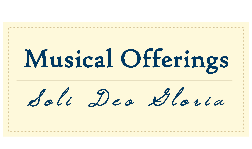Publication Date
2010
Document Type
Article
Keywords
Martin Luther, congregational singing, Reformation
Abstract
Martin Luther played an influential role in the transition from the priest-dominated Catholic worship to congregationally accessible evangelical services. This study demonstrates that, though his musical reforms were not dramatic, they were intentional and effective. Luther’s understanding of music theologically, theoretically, and practically enabled him to effectively utilize available musical resources to make music increasingly accessible, for the purpose of teaching the Word of God. Through Luther’s hymns, people began proclaiming the Word of God musically. Through liturgical reform, Luther provided congregations with a framework through which to incorporate congregational song in the liturgy. Through music education, Luther increased musical literacy, enabling congregations to effectively participate musically in services.
Volume
1
Issue
2
DOI
10.15385/jmo.2010.1.2.1
Recommended Citation
Knight, Jonathan T.
(2010)
"Conservative Radical: Martin Luther’s Influence on Congregational Singing,"
Musical Offerings: Vol. 1:
No.
2, Article 1.
DOI: 10.15385/jmo.2010.1.2.1
Available at:
https://digitalcommons.cedarville.edu/musicalofferings/vol1/iss2/1
Creative Commons License

This work is licensed under a Creative Commons Attribution-Noncommercial-No Derivative Works 3.0 License.
Disclaimer
The CedarCommons repository provides a publication platform for fully open access journals, which means that all articles are available on the Internet to all users immediately upon publication. However, the opinions and sentiments expressed by the authors of articles published in our journals do not necessarily indicate the endorsement or reflect the views of Digital Services, the Centennial Library, or Cedarville University and its employees. The authors are solely responsible for the content of their work. Please address questions to the Digital Services staff.
Copyright
© 2010 Jonathan Knight. All rights reserved.

